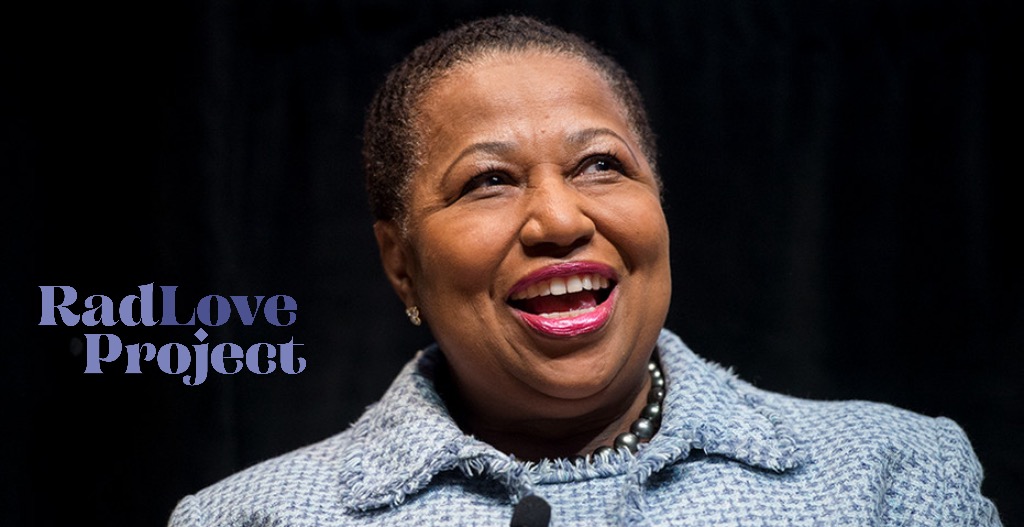Hello RadLove readers and Happy Women’s History Month! Today I’m happy to follow up on Kristin’s awesome piece from last week about Shirley Chisholm and Angela Alsobrook with two additional profiles–former Illinois Senator and 2004 Presidential candidate Carol Moseley Brown, and Representative Barbara Lee of California, who was a 2024 candidate for California’s primary race to replace longtime Senator Dianne Feinstein.
(Before I dive in, a RadLove recommendation for our many readers in New York City–I was fortunate to spend International Women’s Day last Friday enjoying the internationally acclaimed Australian cabaret performer Meow Meow performing her latest show, “Sequins and Satire, Divas and Disruptors: The Wild Women of the Weimar Republic” on LA’s west side. She’ll be presenting the same program at Carnegie Hall’s Zankel Hall on Saturday, March 23. This superb performance of musical stories about fascinating women is HIGHLY recommended!)

Carol Moseley Brown’s career is defined by her notable roles in electoral politics, international diplomacy, and public service. She boasts a considerable list of achievements that have shattered the glass ceiling: she was the first female Senator from Illinois, the first woman to defeat an incumbent Senator in a primary, the first African American Senator from the Democratic pastry, and the first African American woman elected to the Senate.

Carol Elizabeth Moseley was born on August 16, 1947, in Chicago. Her father was a law enforcement officer, while her mother worked as a medical technician at a hospital near their home on the South Side. A Chicago Public Schools graduate, her collegiate education was obtained in her native Illinois, earning a B.A. in 1969 and J.D. with honors from the University of Chicago in 1972. Moseley Braun worked for the USPS and in grocery stores to support her studies.
She briefly entered private practice and then served as an Assistant U.S. Attorney from 1973 to 1977, receiving the U.S. Attorney General’s Special Achievement Award for her work in housing, education policy, and environmental law. In fall 1977, after being recruited to run by neighbors, she won election to the Illinois House of Representatives.
During her five terms, Moseley Braun sponsored legislation to increase salaries for teachers and professors, and was chief sponsor for the landmark 1985 Urban School Improvement Project. She also promoted legislation to end discrimination in housing and private clubs and called for a moratorium on the death penalty.
After just two terms in the House, Moseley Braun became the first African American to serve as Assistant Majority Leader in Illinois. She was rated “Best Legislator” by the Independent Voters of Illinois–Independent Precinct Organization in each of her ten years in the Illinois House. When she retired in 1987, she was recognized by her colleagues as “the conscience of the House.”
In 1988 Moseley Braun returned to Cook County after winning election as Recorder of Deeds, a strategically important position she held until her historic election to the United States Senate.
Following four years in Chicago, Moseley Braun again blazed past historical barriers by becoming the fourth African American elected to the United States Senate, and the first African American woman to serve in the upper chamber. At the time of her election, an African American had not served in the Senate since Massachusetts Senator Edward Brooke’s re-election effort was defeated in 1979. Prior to Brooke’s election in 1967, there had not been a Black member of the Senate for over eighty years.
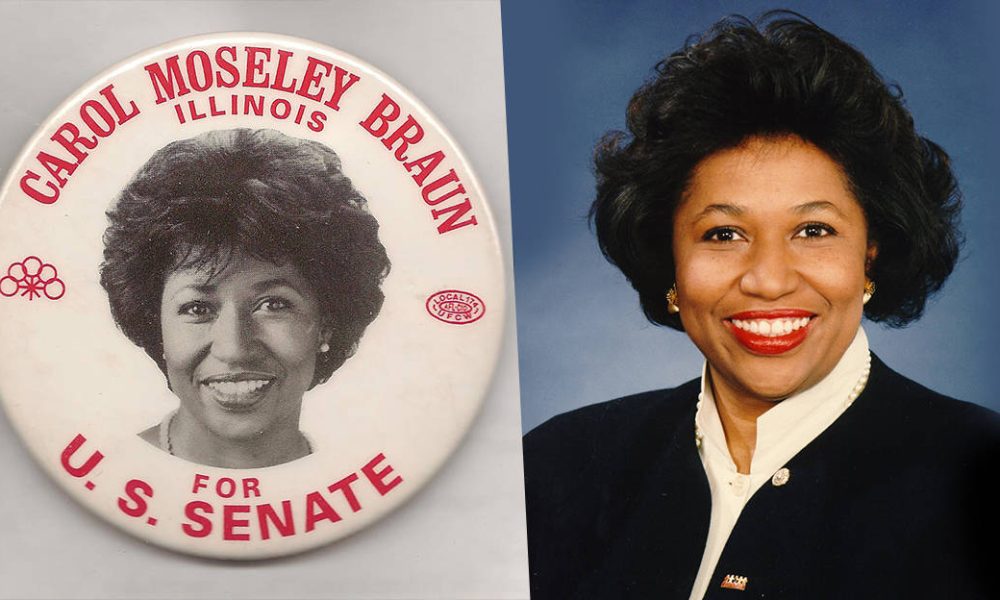
She was elected in 1992, widely considered the “Year of the Woman” as women voters came out in force to voice their displeasure with the Clarence Thomas/Anita Hill proceedings and demand better representation. Moseley Braun was compelled to run by Illinois Senator Alan Dixon’s vote to confirm Clarence Thomas to the Supreme Court; she defeated him in the Democratic primary and went on to win the general election with 53% of the vote. Other formidable legislators including Dianne Feinstein, Patty Murray, and Barbara Boxer were elected to the Senate alongside Moseley Braun in 1992.
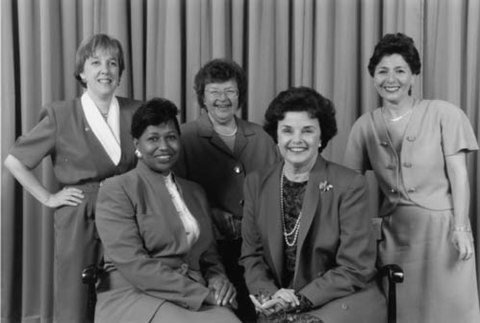
Immediately upon her election to the Senate, Moseley Braun received a surprise visit at her Chicago home from Delaware Senator Joe Biden, who was at the time Chair of the Judiciary Committee that had recently received considerable negative press in the wake of the Thomas/Hill hearings. He told her he wanted her on his committee; her initial interests were elsewhere and he left Chicago without her commitment. However, Biden was able to convince her to join, telling her “the Judiciary Committee needed my voice and my perspectives,” “he wanted to have some women on the committee,” and “he would personally appreciate it.” Alongside Dianne Feinstein, whom Biden had also appointed to the Judiciary Committee, Moseley Braun helped to pass the Violence Against Women Act, the Public Safety and Recreational Firearms Use Protection Act (commonly known as the “assault weapons ban”), and fought fiercely to end government-approved patents of symbols of the Confederacy. In addition, she was the first woman to serve on the Senate Finance Committee. She further championed legislation to fund preservation of Underground Railroad sites, the Education Infrastructure Act, and the Women’s Pension Equity Act. In coordination with other women Senators, she helped persuade a change of rules that allowed women to wear pants on the Senate floor.
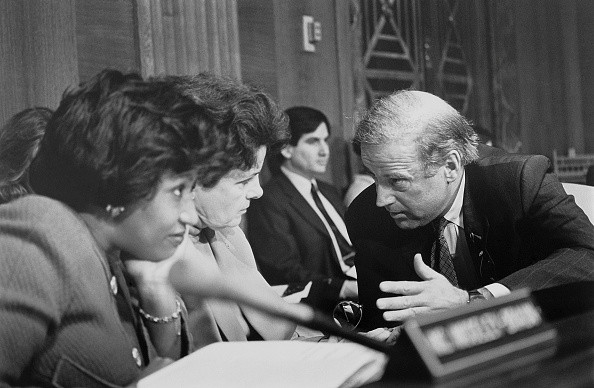
Moseley Braun served one term in the Senate; she lost her 1998 re-election bid to Republican Peter Alexander and left office the following January.
Never content to rest on her past achievements, in 1999 Moseley Braun was appointed Ambassador to New Zealand, Samoa, the Cook Islands, and Samoa by President Bill Clinton, a position she held for two years. She stated this is the role she has enjoyed most, but her diplomatic appointment ended in 2001 with the election of George W. Bush.
Following several years in the private sector, Mosley Braun announced a bid for the U.S. Presidency. At her campaign kickoff she acknowledged her bid was “a long shot” but said she believed she could win given her experience at all levels of government. She ran strongly against Bush-era policies she believed violated civil liberties, and made single-payer healthcare a central campaign issue. As is so often the case with Black women seeking elected office, Moseley Braun had difficulty securing the necessary funding to run a national campaign. She announced the end of her campaign on January 15, 2004, endorsing Howard Dean on the Daily Show ahead of the 2004 Iowa caucus.
After another break from elected office, Moseley Braun announced a bid for the Chicago mayoral race in 2010. Obama ally Rahm Emmanuel was elected to the seat in February of 2011.
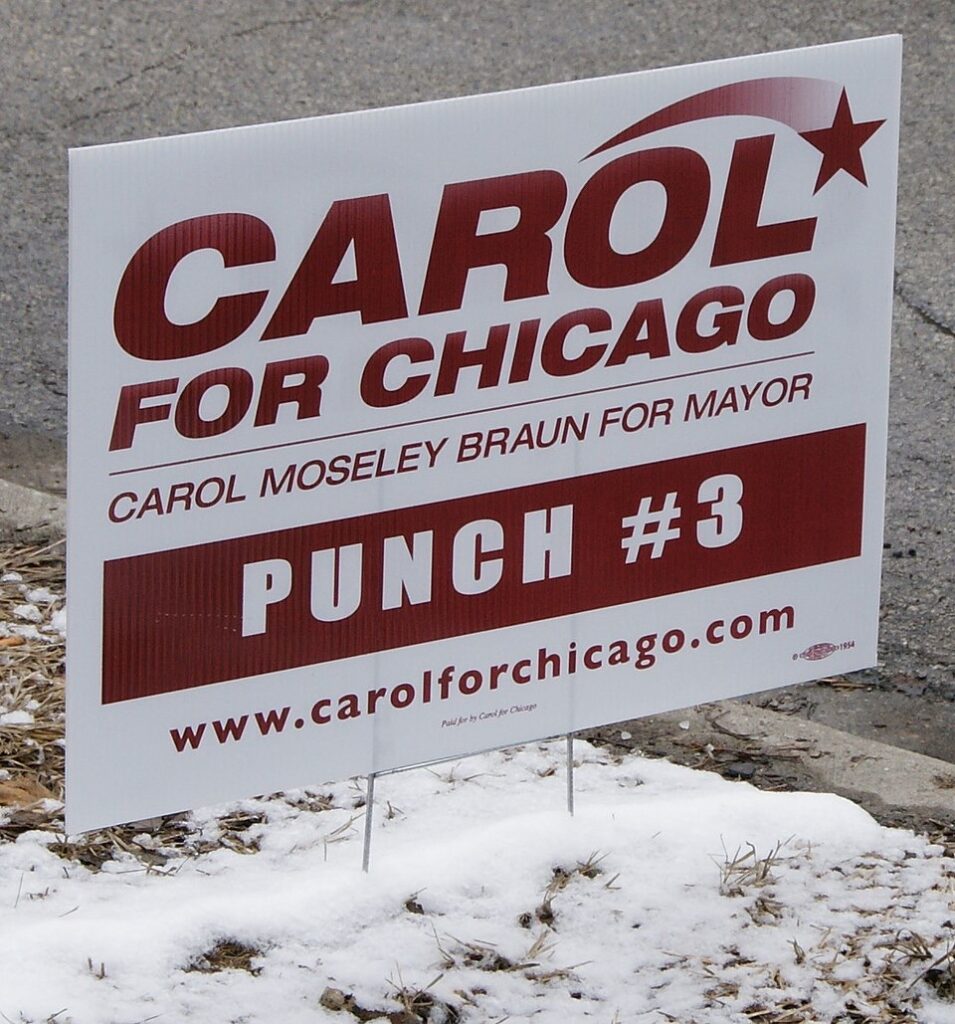
After nearly a decade in the private sector and university teaching, Moseley Braun’s name re-emerged on the national political scene when it was reported she was eager to serve as Secretary of the Interior in the Biden-Harris administration, or potentially another role. Though Biden ultimately selected Deb Haaland to serve as his Secretary of the Interior, in January of 2023 he appointed Moseley Braun to be a member and serve as chair of the United States African Development Foundation.
Today, Carol Moseley Braun’s public service continues through her involvement in boards and commissions, including the DuSable Museum of African American History, the World War I Commission Advisory Board, Our American Voices, and Delta Sigma Theta Sorority.
She is remembered during her time in the Senate for her strong pro-choice stance, her votes against the death penalty, and in favor of gun control measures. She was one of 16 Senators to vote against the Communications Decency Act, and one of only 14 to vote against the Defense of Marriage Act. Her firm convictions to preserve and protect civil rights were the hallmark of her Senate career, and she is remembered there as a strong voice of conscience who created considerable impact.
Barbara Lee Charts Revolutionary Course En Route to 2024 Senate Campaign
While as of the time of this writing longtime Bay Area House Representative Barbara Lee’s campaign has ended following last week’s California primary election, which was won by her House colleague Adam Schiff, we wish to honor her significant legacy of moral clarity in the House and acknowledge her alongside the other Black women leaders who ran for the Senate in 2024.
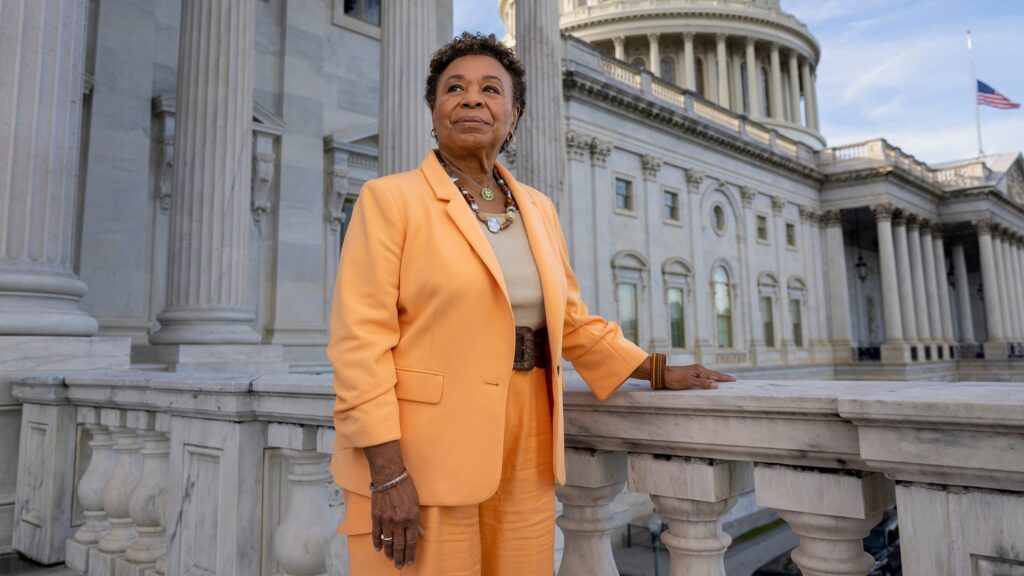
Born in 1946 and raised in Texas, Barbara Lee has represented California’s 12th district since 1998. She began her career in politics working on the Presidential campaign of New York Congresswoman Shirley Chisholm in 1972, serving as one of her delegates at the Democratic National Convention. The following year, she worked on the Oakland mayoral campaign of the Black Panther Party’s co-founder Bobby Seale, resulting in Lee later being surveilled by the FBI.
After working for California House Representative Ron Dellums and eventually becoming his Chief of Staff, she ran for office in 1989, serving in the California State Assembly for six years, followed by two years in the California State Senate.
In 1998, Lee was elected to the U.S. House of Representatives in a special election to replace Ron Dellums, who retired in the midst of his thirteenth House term. In addition to her legislative work, she has held leadership roles on many important committees, including the Congressional Progressive Caucus, the Congressional Black Caucus, the Congressional LGBTQ+ Equality Caucus, the Congressional Cannabis Caucus, the Congressional Social Work Caucus, and the House Steering and Policy Committee.
Throughout her tenure, Lee has been a consistent leader in the anti-war movement. She is perhaps best known for her bold stance as the only member of either chamber of Congress to vote against the authorization of use of force in response to the 9/11 terror attacks. She has strongly resisted U.S. involvement in international conflicts, including the Second Iraq War, the current conflict in Ukraine, and potential future conflicts in regions like Taiwan. Lee was among the first members of Congress to call for a ceasefire in the Israel-Hamas War.
She was a supporter of Barack Obama’s 2008 Presidential campaign and was among the earliest to endorse California Senator Kamala Harris’ 2020 Presidential campaign.
Lee announced her Senate campaign in Oakland on February 21, 2023 following Dianne Feinstein’s announcement she did not intend to run for re-election. She finished third in California’s 2024 primary on Super Tuesday, behind Adam Schiff and Republican Steve Garvey, and ahead of Orange County House Rep Katie Porter.
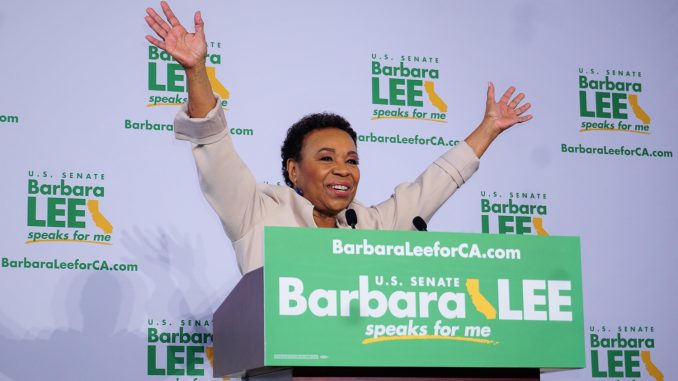
Barbara Lee’s prolific work as a legislator in California and D.C. has focused on key progressive issues including gun control, climate change, education, cannabis policy reform, defense spending, affordable housing, healthcare access, and abolishing the death penalty. As she prepares to step away from a long career in elected office next January, we celebrate her incredible accomplishments on behalf of her constituents across her decades of service, and we commend her for providing Californians with a truly progressive option in the 2024 Senate race.
Next week, we’ll continue our Women’s History Month review of Black women’s historical path to the United States Senate with a profile of 2024 candidate Lisa Blunt Rochester and former California Senator/current Vice President Kamala Harris. Thanks as always for reading, and for sharing this article with your friends and followers!
Join the RadLove movement and help us redefine what is possible.
Sign up for our newsletter and follow us on instagram and spoutible!






